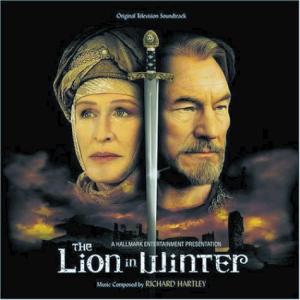************************************************************** EDITOR’s RECOMMENDATION August 2004 **************************************************************
The Lion in Winter
Music composed by Richard Hartley
Conducted by Allan Wilson
Orchestrations by the composer and conductor
Performed by The Slovak Radio Orchestra and Chorus
Available on Varèse Sarabande VSD6571
Running time: 63.02
Crotchet Amazon UK Amazon US

See also:
The Lion in Winter (John Barry – re-recording)
Henry V
William Shakespeare's Hamlet
Shakespeare in LoveRemaking a classic such as The Lion in Winter (1968) leaves all concerned on a hiding-to-nothing. No matter how good, for most audiences a remake is never going to equal the original, is at best going to be second best, at worst, much worse than that. Consider then the lot of a composer faced with scoring a remake for which the original has a classic, well-known-even-to-the-general-public, landmark score.
The man stepping into John Barry shoes – for it was Barry who wrote one of his very finest and most memorable scores for the original The Lion in Winter – is the accomplished British composer Richard Hartley. Not a high profile name, but a composer who has been contributing excellent music to film and television for over 30 years, and who among over 70 scores has penned the music for such notable projects as Aces High (1976), Bad Timing (1980) and Stealing Beauty (1996).
For this story of bitter family feuding in the court of Henry II Hartley has responded with a score very much in keeping with the overall approach taken by Barry – noble brass, distant stately strings, beautiful gentle choral writing in the Catholic Church tradition – without his music being, in key moments, so thrillingly electric. How could one, after all, compete with Barry's spine-tingling main theme without being accused of pastiche? So, while Hartley's score occupies a similar musical world – dictated by what audiences expect of a film with the time and setting of The Lion in Winter – the result is one of very different majestic beauty to its predecessor.
Hartley has penned music which is regal and quiet lovely. His description of 'Elinor of Aquitaine' may happily stand comparison with Stephen Warbeck's theme for the Gwyneth Paltrow character Viola in Shakespeare in Love (1998), while, for instance, distant brass and pastoral woodwinds paint a lyrical portrait of 'King Philip'. The very opening of 'A Family at War' is foreboding, yet the music develops with a majestic timelessness and melodic richness which might even call to mind Vaughan Williams - many cues contain a profoundly English tenderness, 'Salisbury', to give just one example. Against elements of pastoral beauty and courtly grandeur Hartley weaves another necessary thread – pure and lovely church music, as in the plainchant of 'The Chancellor'. Then there is courtly source music, from dances to more introspective pieces in such titles as 'Santa Nicolaus', 'Pastorela' and 'Amors de Terra', before in the final third of the album matters take a darker turn.
'The Crusades' is laced with regretful melancholy, a plaintive, distant lute melody seemingly lost in the reflections of memory. It is but a prelude to the intense grandeur of 'Get Me a Priest', where choir and orchestra come together with compelling, urgent authority. Dark shadows hang over the brooding lyricism of 'Until We Bury You', music which with its woodwind over endlessly sustained strings is more in the tradition of modern John Barry than the composer of the 1960's. Then with 'Revenge' menacing strings circle around woodwind and choir, waiting to strike, rising brass figures join the fray until the piece ignites into chilling orchestral cold fire laced with malevolence. The final cues balance regret, tenderness uncompromisingly, 'All That I Ever Loved' being quiet heartbreaking.
While John Barry's 1968 score will always be the one most remember – and the melodies are more memorable – Richard Hartley has composed a very fine score in its own right. His score is diverse, melodically highly accomplished, orchestrated with subtly and taste, and a fine addition to the great lineage of classically orientated English film scoring. Those who have admired Patrick Doyle's Shakespeare scores, especially Henry V (1989) and William Shakespeare's Hamlet (1996) over the last 15 years will particularly find much to enjoy in this first rate piece of work.
Gary Dalkin
41/2
Return to Index